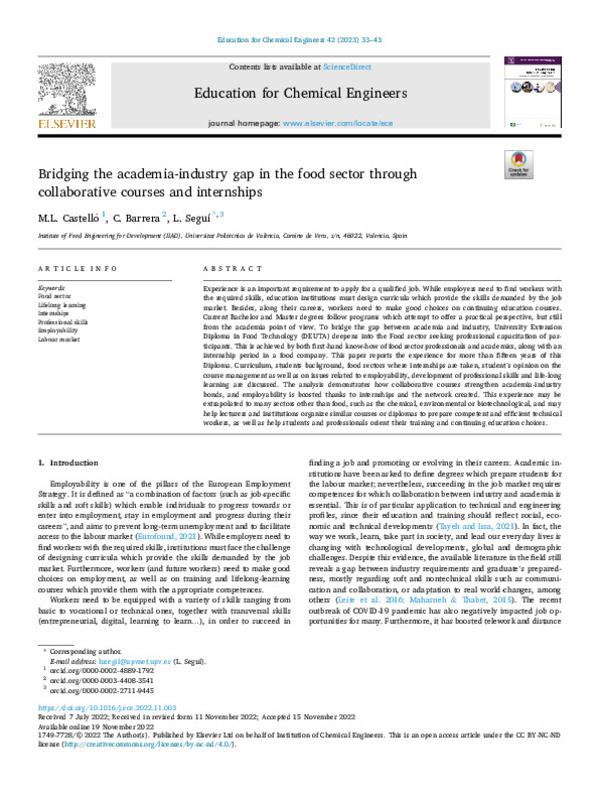JavaScript is disabled for your browser. Some features of this site may not work without it.
Buscar en RiuNet
Listar
Mi cuenta
Estadísticas
Ayuda RiuNet
Admin. UPV
Bridging the academia-industry gap in the food sector through collaborative courses and internships
Mostrar el registro sencillo del ítem
Ficheros en el ítem
| dc.contributor.author | Castelló Gómez, María Luisa
|
es_ES |
| dc.contributor.author | Barrera Puigdollers, Cristina
|
es_ES |
| dc.contributor.author | Seguí Gil, Lucía
|
es_ES |
| dc.date.accessioned | 2023-03-24T19:01:14Z | |
| dc.date.available | 2023-03-24T19:01:14Z | |
| dc.date.issued | 2023-01 | es_ES |
| dc.identifier.issn | 1749-7728 | es_ES |
| dc.identifier.uri | http://hdl.handle.net/10251/192597 | |
| dc.description.abstract | [EN] Experience is an important requirement to apply for a qualified job. While employers need to find workers with the required skills, education institutions must design curricula which provide the skills demanded by the job market. Besides, along their careers, workers need to make good choices on continuing education courses. Current Bachelor and Master degrees follow programs which attempt to offer a practical perspective, but still from the academia point of view. To bridge the gap between academia and industry, University Extension Diploma in Food Technology (DEUTA) deepens into the Food sector seeking professional capacitation of par-ticipants. This is achieved by both first-hand know-how of food sector professionals and academics, along with an internship period in a food company. This paper reports the experience for more than fifteen years of this Diploma. Curriculum, students background, food sectors where internships are taken, student's opinion on the course management as well as on issues related to employability, development of professional skills and life-long learning are discussed. The analysis demonstrates how collaborative courses strengthen academia-industry bonds, and employability is boosted thanks to internships and the network created. This experience may be extrapolated to many sectors other than food, such as the chemical, environmental or biotechnological, and may help lecturers and institutions organize similar courses or diplomas to prepare competent and efficient technical workers, as well as help students and professionals orient their training and continuing education choices. | es_ES |
| dc.description.sponsorship | Funding for open access charge: CRUE - Universitat Politècnica de València. | es_ES |
| dc.language | Inglés | es_ES |
| dc.publisher | Elsevier | es_ES |
| dc.relation.ispartof | Education for Chemical Engineers | es_ES |
| dc.rights | Reconocimiento - No comercial - Sin obra derivada (by-nc-nd) | es_ES |
| dc.subject | Food sector | es_ES |
| dc.subject | Lifelong learning | es_ES |
| dc.subject | Internships | es_ES |
| dc.subject | Professional skills | es_ES |
| dc.subject | Employability | es_ES |
| dc.subject | Labour market | es_ES |
| dc.subject.classification | TECNOLOGIA DE ALIMENTOS | es_ES |
| dc.title | Bridging the academia-industry gap in the food sector through collaborative courses and internships | es_ES |
| dc.type | Artículo | es_ES |
| dc.identifier.doi | 10.1016/j.ece.2022.11.003 | es_ES |
| dc.rights.accessRights | Abierto | es_ES |
| dc.contributor.affiliation | Universitat Politècnica de València. Escuela Técnica Superior de Ingeniería Agronómica y del Medio Natural - Escola Tècnica Superior d'Enginyeria Agronòmica i del Medi Natural | es_ES |
| dc.description.bibliographicCitation | Castelló Gómez, ML.; Barrera Puigdollers, C.; Seguí Gil, L. (2023). Bridging the academia-industry gap in the food sector through collaborative courses and internships. Education for Chemical Engineers. 42:33-43. https://doi.org/10.1016/j.ece.2022.11.003 | es_ES |
| dc.description.accrualMethod | S | es_ES |
| dc.relation.publisherversion | https://doi.org/10.1016/j.ece.2022.11.003 | es_ES |
| dc.description.upvformatpinicio | 33 | es_ES |
| dc.description.upvformatpfin | 43 | es_ES |
| dc.type.version | info:eu-repo/semantics/publishedVersion | es_ES |
| dc.description.volume | 42 | es_ES |
| dc.relation.pasarela | S\478466 | es_ES |
| dc.contributor.funder | Universitat Politècnica de València | es_ES |
| dc.subject.ods | 04.- Garantizar una educación de calidad inclusiva y equitativa, y promover las oportunidades de aprendizaje permanente para todos | es_ES |
| dc.subject.ods | 08.- Fomentar el crecimiento económico sostenido, inclusivo y sostenible, el empleo pleno y productivo, y el trabajo decente para todos | es_ES |








